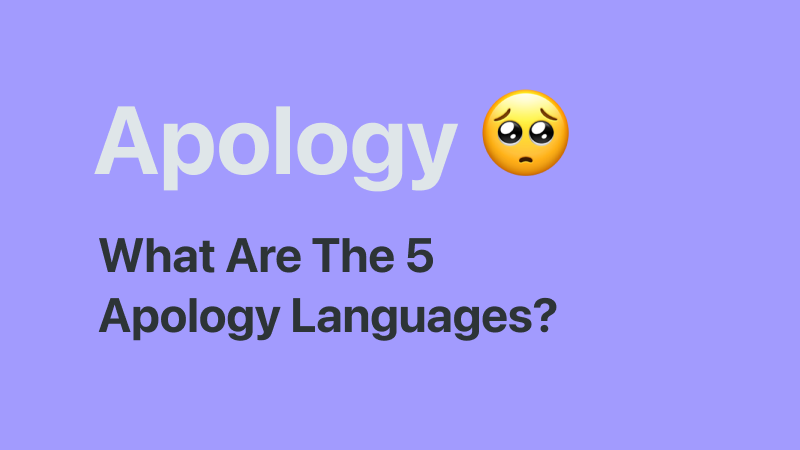What Are The 5 Apology Languages? (A Full Guide)
Apologizing can be tricky, but it's an essential skill for building and maintaining healthy relationships. The way you say "I'm sorry" can make all the difference in how your partner receives and accepts your apology. That's where the concept of "Apology Languages" comes in.
Understanding the 5 Apology Languages
Just like the famous "Love Languages," the 5 Apology Languages describe the different ways people prefer to give and receive apologies. Knowing your partner's Apology Language can help you say "I'm sorry" in a way that truly resonates with them. Let's explore the 5 Apology Languages:
-
Expressing Regret: These individuals appreciate a heartfelt, sincere expression of remorse. They want to hear you say, "I'm so sorry I hurt you. I feel terrible about what happened."
-
Accepting Responsibility: Partners who value this Apology Language want you to own up to your actions and avoid making excuses. A good apology would be, "You're right, I made a mistake and I take full responsibility for it."
-
Making Amends: For these individuals, actions speak louder than words. They want to see you make a genuine effort to make things right, whether it's replacing a broken item or offering to help with a task you neglected.
-
Genuinely Repenting: People who appreciate this Apology Language want to see a real change in your behavior going forward. They need to know that you've learned from your mistake and are committed to not repeating it.
-
Requesting Forgiveness: Some partners feel most comforted when you explicitly ask for their forgiveness, saying something like, "I know I really hurt you, and I'm asking for your forgiveness. Can you please find it in your heart to forgive me?"
Mastering the Art of Apologizing
Regardless of your partner's Apology Language, there are a few key elements to keep in mind when apologizing:
-
Be Sincere: Your apology should come from a place of genuine remorse, not just a desire to "fix" the situation.
-
Be Specific: Don't just say "I'm sorry." Explain exactly what you're apologizing for and how you plan to do better.
-
Give Them Time: Accepting an apology can be difficult, so be patient and don't expect immediate forgiveness.
-
Follow Through: If you promise to make amends, be sure to follow through and do what you said you would.
Self-Reflection Question
After apologizing to your partner, ask yourself: "Did my apology address their specific Apology Language, or did I miss the mark?"
Quick Quiz: What's Your Apology Style?
-
When apologizing, you tend to focus on:
a) Expressing your feelings of remorse
b) Taking full responsibility for your actions
c) Promising to make it up to your partner -
How important is it to you that your partner forgives you after an apology?
a) Very important - I need that closure
b) Moderately important - I understand it takes time
c) Not a big deal - I just want to acknowledge my mistake -
When your partner apologizes to you, what do you appreciate most?
a) Hearing them say they're truly sorry
b) Seeing them take accountability
c) Witnessing a change in their behavior




